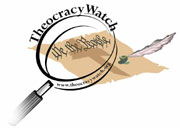
The Rise of the Religious Right
in the Republican Party
|
|||||||
|
|||||||
|
Joan Bokaer, Founder TheocracyWatch D. James Kennedy "We don't want a theocracy" proclaimed D. James Kennedy, Pastor of the Coral Ridge Presbyterian Church in Fort Lauderdale . He was speaking to Terri Gross on NPR's Fresh Air. Kennedy is founder of the "Reclaiming America for Christ Campaign." Kennedy wrote "How much more forcefully can I say it? The time has come, and it is long overdue, when Christians and conservatives and all men and women who believe in the birthright of freedom must rise up and reclaim America for Jesus Christ." (1) But Kennedy sincerely believes he isn't calling for a theocracy. In fact people who identify with the Christian Right shy away from the word "theocracy" for good reason. It's a loaded term associated with repressive political regimes such as the Taliban or the Islamic Republican of Iran. It's hard to imagine that well-meaning leaders of the Christian Right could be leading the United States down a path to a Christian fundamentalist theocracy. Francis Schaeffer Francis Schaeffer, one of the most influential Christian thinkers of our time, wrote in A Christian Manifesto : "We must make definite that we are in no way talking about any kind of a theocracy. Let me say that with great emphasis." (2) Earlier in his Manifesto, Schaefer discusses the relationship between government and religion. "The civil government, as all of life, stands under the law of God." (3) If civil government "stands under the law of God," then God is the supreme authority. But whose God? Is it a Protestant or Catholic God? A general answer might be the Supreme Ruler is derived from Judeo-Christian teachings -- a monotheistic God which includes Islam. Where do Buddhists and Hindus fit into this government? Religions that aren't monotheistic are considered Satanic. What about people who don't believe in God? Do they have a place in this government? And if people who worship an authoritarian God gain full political power, what will keep them from imposing their narrow reading of Scripture on the rest of society? Ralph Reed Ralph Reed is a highly influential political operative. He was a high-ranking official in the Bush-Cheney '04 campaign. In 2002, as Chair of the Georgia Republican Party he engineered a Republican sweep of that state. But perhaps his greatest legacy (so far) was his work as Executive Director of the Christian Coalition where he and Pat Robertson succeeded in taking "working control" of the Republican Party. Reed was featured on the cover of Time magazine on May 15, 1995 as "The Right Hand of God." Time credited Christian Coalition with a Republican coup in 1994 that gave the Republican Party majorities in both houses of Congress for the first time in 40 years. On the subject of Democracy Reed writes: "The surest antidote to tyranny is a free people who believe it owes its allegiance to a Higher Power, not the government. The consent of the governed rests upon faith in a sovereign God. Faith as a political force is the very essence of Democracy."4 As with D. James Kennedy and Francis Schaeffer, Reed does not believe in theocracy. He just calls for a Democracy where everyone believes in "a sovereign God." But whose God? Religious wars decimated Europe for two thousand years over that very question. And again, what about people who don't believe they owe their allegiance to "a Higher Power." Can they be a part of Reed's Democracy? Supreme Court Justice Antonin Scalia From Supreme Court Justice Antonin Scalia: "...Government...derives its moral authority from God. It is the minister of God with powers to "avenge" to "execute wrath" including even wrath by the sword." The minister D. James Kennedy, philosopher Francis Schaeffer, political operative Ralph Reed, and Supreme Court Justice Antonin Scalia may say that they do not advocate a theocracy, but, in legal parlance, they are making a distinction without a difference. Once it is established that their God rules supreme, we become a theocracy.
Last updated: July 23, 2005 , 2005 |
|||||||
| home | contact | about us | |||||||